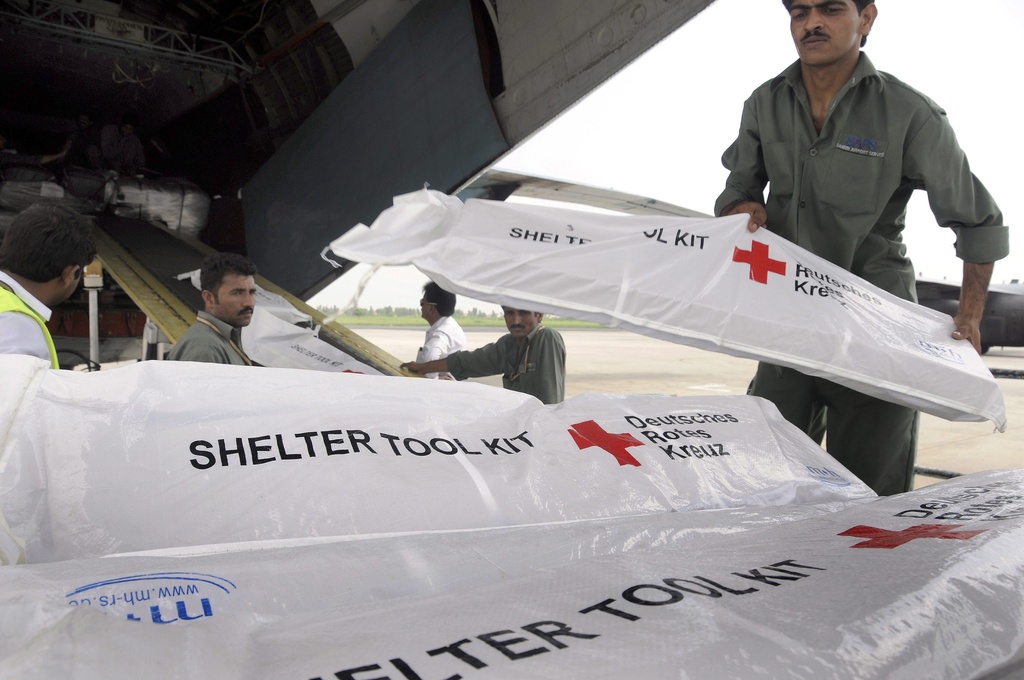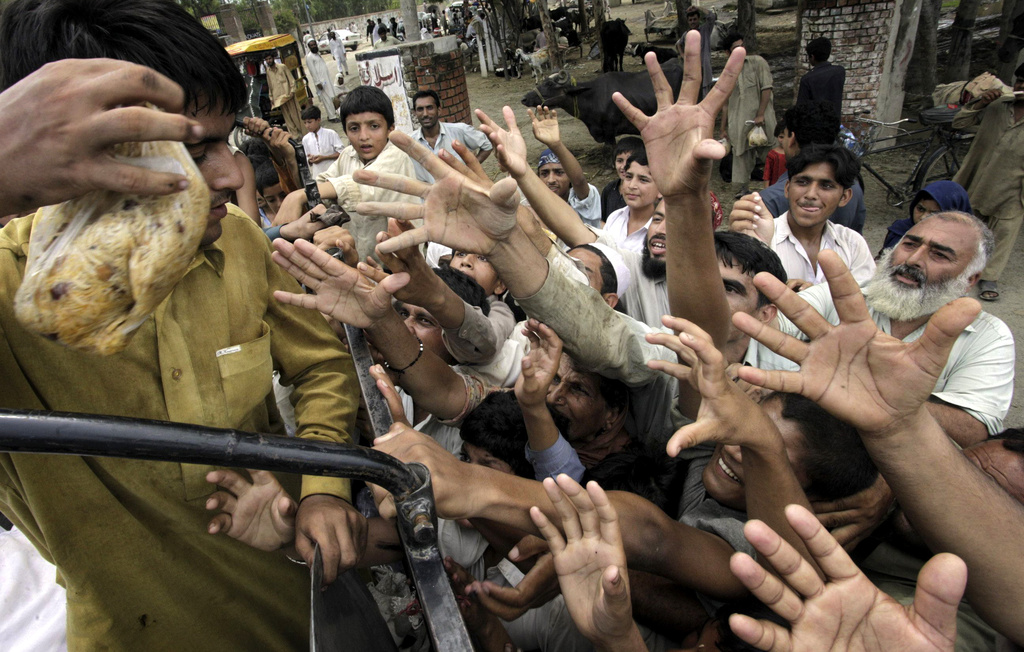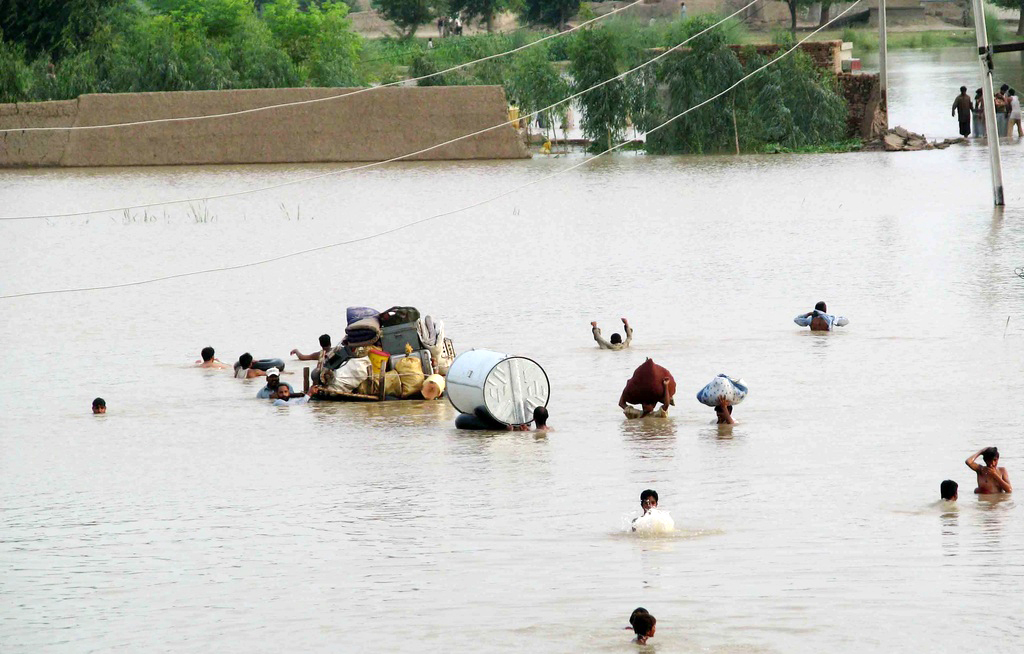Pakistan flood aid failing the needy

In the worst-hit areas of Pakistan’s flooding, aid is not reaching many people who have been left homeless and without drinking water and food.
Around 20 million people have been affected by the floods, prompting the United Nations to appeal for $460 million (SFr482 million) in aid. swissinfo.ch reports from among two of the most affected villages in the country, in the districts of Nowshera and Charsadda.
A stack of old tapes, a bracelet and two handfuls of wet grain. Asim Alam carefully puts his belongings onto a muddy blanket. His feet immersed in water, he continues to search among remains of what was once his home. Nearby, his cousin Tahseenulah is collecting their only asset – the wooden beams that were the foundation of their home and which will be used to rebuild it.
The 19 members of Alam’s family shared a house made of straw, sand and clay. Like the 120 other such huts in the village of Pashtun Garhi, it was quickly destroyed by mud slides.
“It was one o’clock in the morning. My wife heard the sound of the roaring river and woke me up. We quickly left with the children. I wanted to go back to take some things, but the water was already up to my neck. At that moment, the house fell apart before my eyes,” recalls Asim.
The Pashtun Garhi village, located two hours from Islamabad, was lucky. None of the residents died on the night of the flood. But the fields were devastated, the autumn harvest lost and the livestock decimated. The farmers do not know how they will get through the winter.
“Ajmal and me, we had 15 cows,” says Tahseenulah. “By selling the milk we could have a comfortable life for our wives and children. But now, 13 of the cows are dead, drowned. This is a disaster.”
Left out
In the village centre, the UN High Commission for Refugees and a Pakistani association are organising the distribution of tents and cooking equipment. Dozens of fathers gather at the entrance to the village school, which is serving as a base.
Everyone knows that there aren’t enough to go around. “They are only going to hand out 75 tents, but our village has more than 6,000 inhabitants,” says one of the men. Local coordinator Mueed Khan admits Pashtun Garhi is one of the last villages in the area to get help: “only farmers live here… no politicians, no one important who can pull strings and ask for help and aid”.
Some residents are continuing to search among the ruins of their homes. “We know there is aid distribution,” says Ayoub, a father. “But the organisers are checking the identities of those who ask, so as not to give aid twice to the same family. And we don’t have any form of identification, the mud took everything… so we do not get anything.”
Like most of the villagers, Ayoub and his children have moved in with relatives, a few kilometres away. In the Pashtun region, it is family solidarity that is helping the displaced to survive, more than aid from the government or humanitarian organisations.
Unprepared
“What is unusual with these floods is that they are the worst in Pakistan in 80 years,” says Jean-Marc Favre, the International Committee of the Red Cross (ICRC) relief coordinator in Peshawar.
“Unlike India or Bangladesh where this kind of event is common, here one or two generations have gone by without experiencing serious flooding. There is no mechanism in society for coping with the crisis.”
Three weeks after the flooding first began, the south is still submerged. The water has started receding in the north, the first hit. Now the country is facing a health crisis with wells and other drinking water sources contaminated. The floods have carried with them excrement, chemicals, dead animals – and toxic bacteria that cause deadly dysentery or cholera.
In the village of Ishoghi, people quickly realised they could no longer drink their well water when one of the rare cows to survive the floods drank from it and died.
“They have taken the bucket away so that there are no more accidents, but now there is a lack of water,” says Ghulam Azrat, the head of the village. “We are dependent on distribution by humanitarian organisations, and you never know when they are coming through.”
Isolated villages
Finding sources of drinking water and cisterns have become some of the main ways the Geneva-based ICRC and Pakistan Red Crescent Society are helping. But it is a long process: in two days, their teams can clean up just four wells, while hundreds of square miles continue to be affected.
The water that has covered Punjab and Sindh regions could still take weeks to recede. It’s a difficult situation for Favre to accept.
“What is terrible about water-related disasters is that we cannot do anything while the areas are submerged. We know that there are isolated populations that have no food, no help, no drinking water,” he tells swissinfo.ch.
“But we have to wait until the access roads are passable again in order to help them. We must wait and be patient. It’s frustrating.”
Clementine Mercier in Pakistan, swissinfo.ch (Translated from French by Jessica Dacey)
The funding provided under the emergency aid for flood victims in Pakistan has been increased.
The foreign ministry is preparing for a long stint in the country.
Bilateral emergency assistance: SFr800,000
Contribution to the ICRC: SFr3,000,000
Contribution to the World Food Programme: SFr1 million
Source: Foreign ministry as of August 20, 2010
More than $800 million has been donated or pledged to help Pakistan’s flood victims, Pakistan said on August 22.
(Millions)
USA: $102
Saudi Arabia: $65.3
Britain: $64.76
European Commission:$54.15
Australia: $31.62
UN Central Emergency Response Fund: $16.60
Norway: $14.81
Japan: $14.44
Germany: $12.44
Turkey: $11.77
Denmark: $11.74
Sweden: $9.98
China: $9.26
Finland: $5.77
Spain: $5.51

In compliance with the JTI standards
More: SWI swissinfo.ch certified by the Journalism Trust Initiative














You can find an overview of ongoing debates with our journalists here . Please join us!
If you want to start a conversation about a topic raised in this article or want to report factual errors, email us at english@swissinfo.ch.